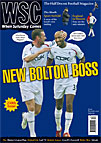 The omens did not look good for Russia after Wembley, but in Moscow there was a rare success for Europe’s biggest underachievers. Saul Pope explains why the only English winners were the supporters
The omens did not look good for Russia after Wembley, but in Moscow there was a rare success for Europe’s biggest underachievers. Saul Pope explains why the only English winners were the supporters
In the immediate aftermath of Russia’s 3-0 defeat to England at Wembley, a journalist at the Moscow daily Sport Express imagined the arch twisting over Wembley to be a noose around the neck of his national team. Russia seemed destined to fail again; despite having the largest population of all the European nations to draw on, the national team have not made it past the first round of a major tournament since becoming the official successors to the Soviet Union side, and they have a less than impressive qualifying record (just four out of the past seven major tournaments). A Russian friend with whom I attended that game glumly surmised that the only victory any Russians would get over England was the illegal smoking den hastily set up in the Wembley toilets at half time, which almost went undetected by the authorities.
Somewhat downbeat in the build-up to the return match, the press focused on other aspects of the game rather than the likely outcome. Sport Express ran a front-page article detailing how a small town near Moscow was making a flag especially for the match, which was so big it could only be flown to the stadium. A day later, attention had turned to how the England team were being guarded “as heavily as the Queen”, and to how the press was not allowed to photograph them at the airport or their hotel.
But none of the pundits was pessimistic enough to predict a defeat for their team, although many expected a draw. Spookily, an uncanny number foresaw a 2-1 victory, including Aleksandr Panov, scorer of two goals the last time Russia beat a “big” side – France in 1999. Indeed, writing in Sports Daily he predicted accurately: “We’ll create one of the goals ourselves; the other will be the result of an English mistake.” He added that it was not that big a game after all: “France were world champions when we played them; England haven’t won anything at international level for a long time.”
Sport Express had devoted nine pages to its Wembley post-mortem. It went one better following the home win, taking ten pages to praise Russia and criticise their opponents. The same journalist who had felt the noose around his neck at Wembley, Igor Rabiner, suggested the English deserved to lose because of their attitude over the two games. “Take this, gentlemen, for rudely switching off the lights at Wembley when the Russia team came out to warm up. Take this for seating our trainer Hudiyev on the top tier behind one of the goals when he came to watch you against Israel. Take this for refusing to escort our team bus in London. Take this for ignoring the four Moscow schoolchildren who waited heroically outside your hotel at midnight for autographs. Take this for the reaction of Ian Wright, who, when our correspondent called for a pre-match comment, told him to ‘fuck off’.”
The England fans came out of things somewhat better. Much was made of the wreath placed at the Tomb of the Unknown Soldier, which featured in newspapers and on the television news. Sport Express also covered the visit of 25 English visitors to a Moscow school, where they gave out various football-related souvenirs. “We always imagine the English to be very prim,” commented one schoolteacher, “but they were very cheerful and open. I never imagined that a meeting with a complete foreigner could be so informal.” On top of this, the paper also praised the openness and friendliness of all the English fans, which it noted was in stark contrast to the attitude of their team.
Perhaps the one hope for Steve McClaren lies in the fact that Russia have suffered from the same problem as England in recent times – they can’t win crucial games. Their history throughout the Nineties and into this century has been one of heroic failure. The 3‑2 victory in France in 1999 was followed by a home draw with Ukraine, which saw the side miss out on Euro 2000. In 2002, they narrowly lost to Belgium at the World Cup, when only a win would see them qualify from a weak group. Russia didn’t travel to Germany 2006; although they scored 23 points in qualifying and only lost once, they finished third in their group thanks to a tepid 0-0 draw in Slovakia in their final game. Don’t bet against nerves, and a 0-0 draw, in Israel.
And if England don’t qualify, at least I and my compatriots will know that a foreign nation now has a more positive view of us, thanks largely to our travelling fans; not something we have been able to say too many times over the past 25 years.
From WSC 250 December 2007